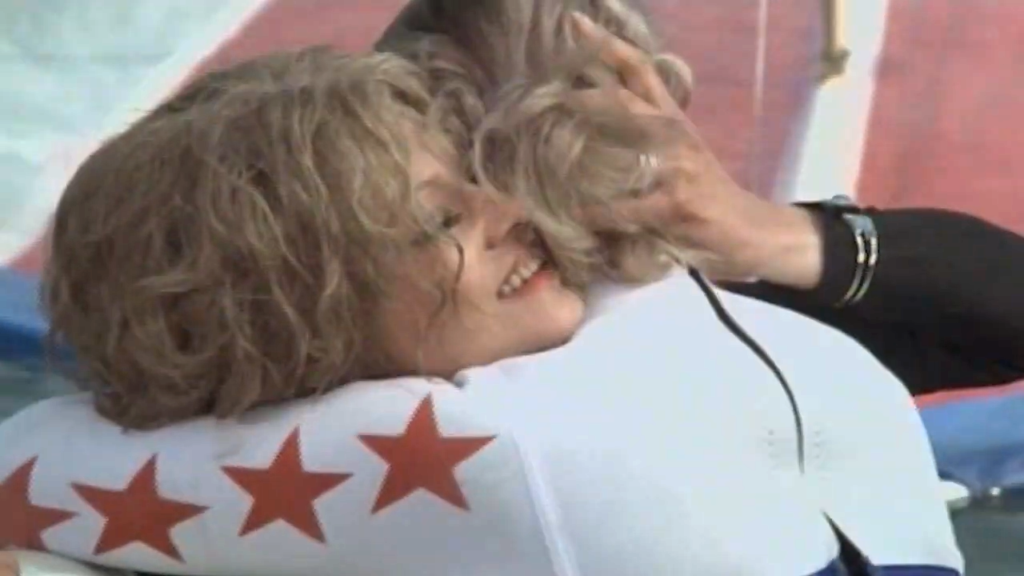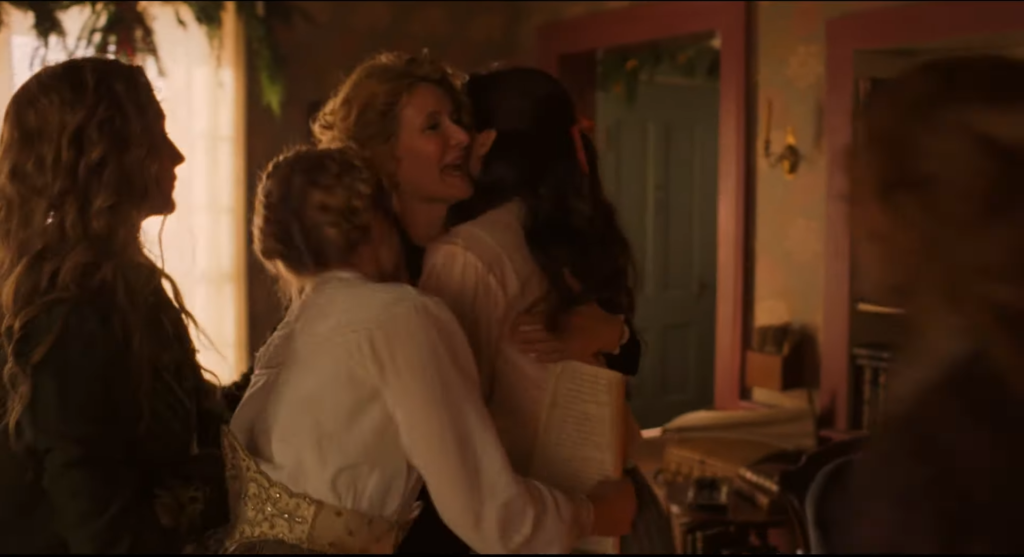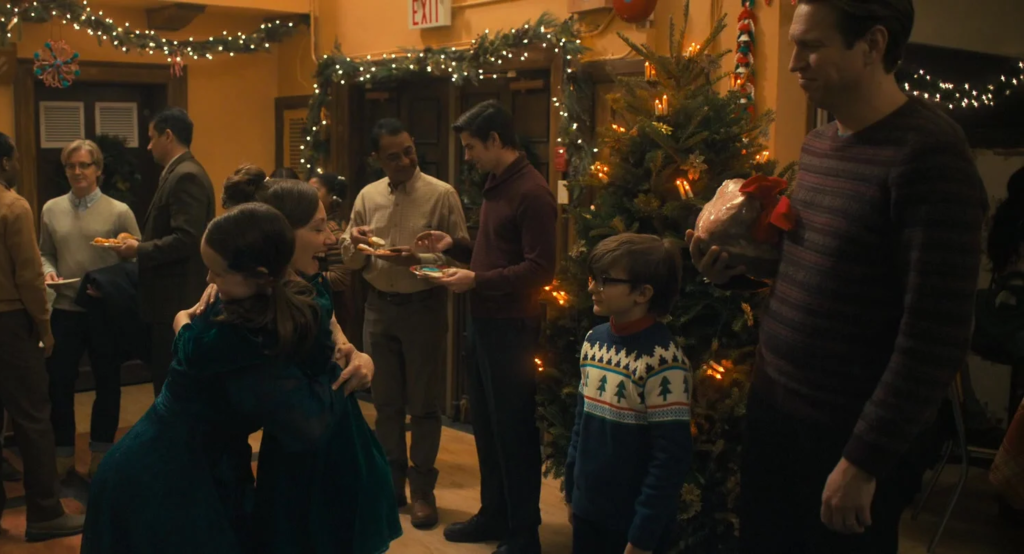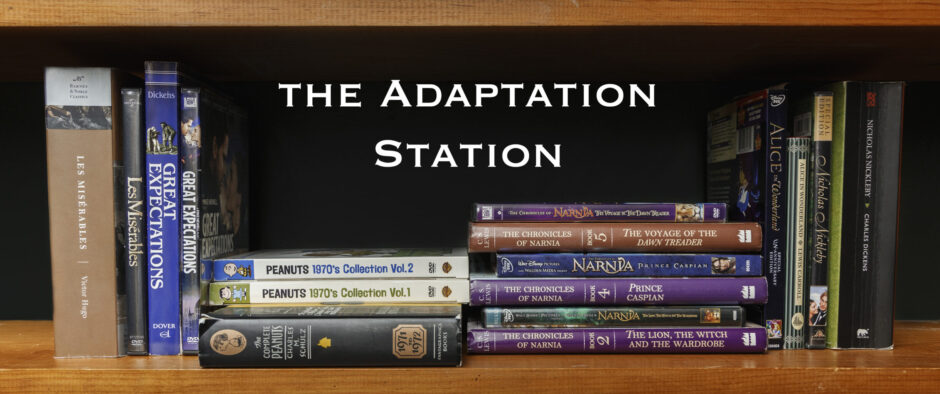In honor of Mother’s Day this year, I’m doing a post looking back on some of my favorite mom characters from adaptations this blog has covered. It shouldn’t be a surprise that parents pop up in so many stories, even more so than romance, since, after all, everybody has parents. Still, considering how conventional it is for the mothers of protagonists to die in childbirth[1]Even back in the 1700s, Jane Austen joked about it in her book Northanger Abbey., I was surprised, looking back over this blog, to see how many of the stories it’s discussed have mothers as prominent characters. I decided to only write about four of them in this post, limiting myself to a certain kind of “Mom” archetype. No evil mothers (Sorry, Lady Susan) or even just dysfunctional ones (so no Mrs. Bennet.)[2]Although, in fairness, the only Pride and Prejudice adaptation I’ve reviewed in depth makes her a tad more of a sympathetic character than the book does. I’m also sticking to biological mothers, not adopted ones like Betsey Trotwood, though I did allow ones who were also mother figures to characters besides their children. To qualify for this list, a mother has to not only love her child or children but be actively raising them, disqualifying Fantine and Lady Dedlock. While the four winners didn’t have to be perfect, they had to be at least good mothers. I didn’t plan for this but they each ended up being from a story (originally) for young people though not necessarily the same age.
After all that whittling things down, who made the cut? Well…
Mary Darling (Olivia Williams) from Peter Pan (2003)

Mother of Wendy (Rachel Hurd-Wood), John (Harry Newell) and Michael (Freddie Popplewell)
Adopted Mother (eventually) to Nibs (Harry Eden), Slightly (Theodore Chester), Curly (George MacKay), Tootles (Rupert Simonian) and the Twins (Patrick and Lachlan Gooch.)
Married to George (Jason Issacs)
I should say that the 2000 Peter Pan is a more consistently great adaptation, in my opinion, but the character of Mrs. Darling isn’t developed as much in it and while Barbara McCulloh is well cast, Olivia Williams does a better job of embodying the character if you ask me.
Mrs. Darling represents a specific maternal archetype: warm, loving, beautiful, sweet, patient and soothing. Unlike her husband, a decidedly flawed fatherly archetype, she’s seemingly perfect.[3]Mr. Darling’s personality is pretty different in the 2003 movie from what it is in the book, with his prouder, more commanding characteristics being given to the new character of Aunt Millicent … Continue reading Or is she? According to Peter Pan‘s creator, J. M. Barrie, she’s a bit too sweet for her own good. When her children thoughtlessly fly the coop, abandoning her, she doesn’t get angry or even consider punishing them should she get the chance. She, not being able to follow them to Neverland, just tearfully waits for their return, always leaving the nursery window open for them. Part of the original book’s thesis was that children will always take advantage of this kind of unconditional love. Thus, to be a mother (and, arguably, to be an adult) is to leave oneself open to abuse. In the penultimate chapter of Peter Pan, Barrie wrote that he despised Mrs. Darling for her weakness but then after describing her sorrow, he turned right around and wrote, “I find I won’t be able to say nasty things about her after all. If she was too fond of her rubbishy children, she couldn’t help it…Some like Peter best and some like Wendy best but I like her best.” How much of this was Barrie being playful with his authorial voice and how much of it was sincerely meant is anyone’s guess, but I wouldn’t be surprised if Mrs. Darling really was his favorite of the characters. Her motherly virtues and her motherly plight certainly are part of Peter Pan‘s appeal.
Of course, the movie doesn’t have Barrie’s narration[4]Well, it does have recurring voiceover narration (read by Saffron Burrows) which often draws from Barrie but that’s not the same thing. and you don’t really get this double sense of Mrs. Darling as both heroic and pathetic from it. This blog post is supposed to be about adaptations of these maternal characters, but I find I’ve written an entire paragraph that’s all about the original. Not a promising start. I’d better course correct. The biggest thing that the 2003 adaptation brings to the character of Mrs. Darling is a speech she gives to her children about their mild banker father who “has never brandished a sword nor fired a pistol, thank heavens, but he has made many sacrifices for his family and put away many dreams.” Using Barrie-esque language, she describes him as putting those dreams in a drawer and occasionally taking them out at night to admire them. “It gets harder and harder to close the drawer. He does. And that is why he is brave.” The movie suggests that unglamorous but self-sacrificing Mr. Darling may be the real hero rather than the dashing Peter Pan (Jeremy Sumpter) whose eternal childhood comes with perpetual selfishness.[5]Well, that’s a bit of an oversimplification. In the original story anyway, Peter does have moments of unselfishness, most notably when he and Wendy are stranded on Marooners’ Rock, he … Continue reading But now we’re drifting from the subject of mothers to fathers, so I’d better get back on topic.
Ellen Andrews (Barbara Harris/Jodie Foster) from Freaky Friday (1976)

Mother of Annabel (Jodie Foster/Barbara Harris) and Ben (Sparky Marcus)
Married to Bill (John Astin)
I know most people prefer the 2003 Freaky Friday and I’ll grant that Jamie Lee Curtis and Lindsay Lohan give better performances as that movie’s equivalent of this mother than Harris and Foster gave. (If you don’t know the premise of Freaky Friday, it’s about a mother and daughter who switch bodies for a day hence my crediting two actresses as one character.) But I prefer this adaptation since it’s closer to the original book by Mary Rodgers and its characters. That’s not to say Mrs. Andrew is exactly the same though.
Like Mrs. Darling, Ellen Andrews is good looking, gracious, maternal and conventionally ladylike but, unlike Mrs. Darling, we see her yelling at and arguing with her daughter. Not that I blame her since Annabel is something of a slovenly, irresponsible, opinionated rebel. The story reinforces her mother’s words, “When you’re grown up, people don’t tell you what to do. You have to tell yourself which is sometimes more difficult.” Mom is even more justified in the source material. There Mrs. Andrews isn’t a protagonist on equal footing with Annabel but a mentor figure who inexplicably has the ability to swap bodies with her daughter. She does so for the better part of a day to teach her a lesson and succeeds in this perfectly. Not only does half the film follow Mrs. Andrews, but it also makes her a more flawed character who has her own lesson to learn.[6]For what it’s worth, Mary Rodgers wrote both the book and the screenplay. At the beginning, she glibly tells Annabel that “childhood is the best time of a person’s life.” Then when they switch places through means mysterious to both of them, she finds she’s expected to have all kinds of skills she never learned as a kid. She has to develop film for a still photography class, use an electric typewriter, keep time in a marching band, play field hockey and waterski. She also gains a new respect for the complex social dynamics of school. Ellen easily wows her daughter’s history teacher (Barbara Walden) with her knowledge but when she does so, her daughter’s peers resent her for making them look bad, branding her a nerd, a showoff and a teacher’s pet. “How do you win?” she wonders. “One bunch thumps you if you don’t do well, the other bunch snubs you if you do!”
In spite of her having more to learn in this adaptation, I’d still call Ellen a good mother.[7]And I wouldn’t say the mother in the book was meant to be totally perfect by the way. The story backs up her daughter’s criticism of her smoking addiction. (It affected her sense of … Continue reading When she’s bruised and exasperated from playing field hockey in Annabel’s place, she considers calling it quits. Then members of the other team taunt her or, rather, her daughter, calling her “yellow.” “Annabel yellow?” thinks Mrs. Andrews. “Sloppy, yes. Yellow, never!” And with that, she’s back in the game and even manages to score a goal-though not for the right team. Whatever her criticisms of her daughter, she won’t let anyone besmirch her honor. (Indeed, that’s probably why she’s so tough on her.) And for all their differences, both Ellen and Annabel have the same determined spirit. It turns out they also share a capacity to admit their flaws. After having to do laundry, iron shirts, pay a mechanic (Jack Sheldon), attend a parent-teacher conference and cook a buffet for her father’s employers at the last minute, Annabel tells her mother she’s a lot dumber than she thought she was.[8]The daughter in the 2003 movie isn’t humbled nearly as much. That’s one of the reasons I chose this version. Smiling, Ellen hugs her and says, “Oh, my darling, aren’t we all?”
“Marmee” March (Laura Dern) from Little Women (2019)

Mother of Meg (Emma Watson), Jo (Saoirse Ronan), Beth (Eliza Scanlen) and Amy (Florence Pugh)
Honorary mother to Theodore Laurence (Timothee Chalamet)
Married to “Father” March (Bob Odenkirk)[9]I don’t believe either parent is named in the original book or this particular adaptation.
I’m more of a fan of Susan Sarandon’s performance as this character in the 1994 Little Women but I believe this movie’s script does a far better job of developing her as a character and it’s not like Laura Dern is bad in the role. (The Little Women film that resonates with me the most, personally, is actually the 2018 one but the Marmee in it is fairly underwhelming.)
This character represents a motherly archetype even more idealized than Mrs. Darling’s. She combines that fictional mom’s loving attitude and warmth with some of Mrs. Andrews’s toughness and emphasis on discipline-without needing to learn to empathize with her children’s feelings. When her youngest daughter gets caned at school for drawing a caricature of her teacher (Bill Mootos), she immediately takes her out of the class, but she also makes sure Amy knows she “did wrong and there will be consequences.” She supports her children’s various artistic ambitions, no matter how impractical, and while the movie doesn’t show this as the book does, it’s implied she discourages them for marrying for money. But she also doesn’t hesitate to contradict their wishes by asking them to give their Christmas feast to their destitute neighbors, chiding Meg for wearing too small shoes for the sake of fashion and urging Jo and Amy not to be angry with each other. She models hard work and selflessness by helping out at a Soldier’s Aid Society. I don’t blame anyone for considering Mrs. March insufferably preachy and too good to be true, not in theory anyway, but I always admire her when I read the book by Louisa May Alcott or partake of an adaptation of it. Maybe it’s the strength the character shows in the face of the harsh circumstances she faces with her husband at war, a daughter with Scarlet Fever and not much money.
Is Marmee really perfect? Not necessarily. In one scene, Jo is terrified that she’ll never be able to control her fierce temper. Surprisingly, the saintly Marmee says she reminds her of herself. “I’m angry nearly every day of my life,” she admits. “I am not patient by nature but with nearly forty years of effort, I’m learning to not let it get the better of me.” This confession gives Jo hope for herself. Of all the Little Women movies, this is the only one to include this moment from the book[10]The 2017 miniseries includes it too, but I found that one underwhelming and have never blogged about it. I haven’t watched other miniseries adaptations. and it’s a big reason why I chose to praise this particular version of the March matriarch. This mother’s standards may be high but she’s willing to admit she doesn’t always live up to them herself. That scene isn’t the only moment of vulnerability from Marmee that this adaptation retains from the source material. When Beth dies[11]In the book, this was right before she dies whereas in the movie, it’s right afterwards., she, who has been a rock of Gibraltar for her daughters throughout the story, breaks down crying and turns to one of them for comfort.[12]The 1933 movie also includes this.
Grace Bradley (Judy Greer) from The Best Christmas Pageant Ever (2024)

Mother of Beth (Molly Belle Wright) and Charlie (Sebastian Billingsley-Rodriguez)
Honorary mother to Ralph (Mason Nelligan), Imogene (Beatrice Schneider), Leroy (Ethan Matthys-Wood), Claude (Matthew Lamb), Ollie (Essek Moore) and Gladys Herdman (Kynlee Heiman)
Married to Bob (Pete Holmes)
Unlike with Peter Pan, Freaky Friday or Little Women, I’ve only blogged about one adaptation of The Best Christmas Pageant Ever in anything like detail. But while I enjoyed Loretta Swit’s portrayal of this character in the 1983 movie, I think I’d pick Judy Greer’s version even if I had more candidates from which to choose.
The fact that this character is a mother was somewhat irrelevant in the original book by Barbara Robinson. The first-person narrator being her young daughter allowed her to give the readers a behind-the-scenes look at her directing her church’s annual Christmas pageant one year. The 2024 movie, being a tad more sentimental, makes motherhood a bigger theme and the relationship between Grace and Beth[13]Neither of them had names in the literary Best Christmas Pageant Ever by the way but those ones do come from Barbara Robinson. Grace was named by the stage adaptation written by the author and Beth … Continue reading more important. It also has Mrs. Bradley become something of a surrogate mother, or a mentor figure anyway, to the Herdmans, “the worst kids in the history of the world,” who muscle their way into the main roles of the Christmas pageant. While she isn’t put on a pedestal as much as Marmee or Mrs. Darling, like the former, this is a mom who keeps it together in a terrible situation. OK, maybe directing a Christmas pageant starring the diabolical Herdmans isn’t as stressful as the prospect of a husband or a child dying or having all your kids disappear or suddenly exchanging bodies with your daughter but it’s up there. I say she isn’t put on a pedestal since her motivation for giving them a chance starts out as pride more than a desire to show them Christian charity but that comes to change. “The whole point of the story is that Jesus was born for the Herdmans as much as He was for us,” she tells her daughter. “We’d be missing the point of all of it if I turned them away.”
Grace chides her stars for things like taking the Lord’s name in vain, hitting each other and hypothetically snatching a baby from a stroller outside the supermarket to use as Baby Jesus in the pageant but she also compliments them on asking good questions about the Christmas story. She defends them to an understandably hostile public on the rare occasions when they’re wrongly accused. (“The Herdman don’t talk about underwear during rehearsals. That was another boy.”) And when they want the pageant to end with Mary and Joseph brutally killing Herod, she points out that “they picked the right villain.” As Beth says looking back on the whole thing as an adult (when she’s played by Lauren Graham), “Maybe my mom didn’t lead committees or run a business or wear a power dress while shopping, but she did the right thing when no one else would.” I described the literary version of Mrs. Bradley as less sentimentalized, but that description applies to her too.
I wanted to end with this particular mother because she’s the one that reminds me the most of mine. I grew up seeing my mom direct our church’s Christmas program every year.[14]Technically, that makes her more like the character of Mrs. Armstrong (Mariam Bernstein) but never mind. Those rehearsals could be quite a hassle but while I can recall her worrying about how the programs would turn out, I never recall her losing her cool with the cast. My mother also works as a schoolteacher and regularly deals with kids as troubled as the Herdmans or worse. I don’t know how she keeps at it day after day, but she does. She’s always fair to me and my brother, giving credit and blame when they’re due and to whom they’re due.[15]Or if she doesn’t, she apologizes before too long. She inspires me just like Grace Bradley inspires Beth.
Love you, Mom!
References
| ↑1 | Even back in the 1700s, Jane Austen joked about it in her book Northanger Abbey. |
|---|---|
| ↑2 | Although, in fairness, the only Pride and Prejudice adaptation I’ve reviewed in depth makes her a tad more of a sympathetic character than the book does. |
| ↑3 | Mr. Darling’s personality is pretty different in the 2003 movie from what it is in the book, with his prouder, more commanding characteristics being given to the new character of Aunt Millicent (Lynn Redgrave), but he’s basically a likeable bumbler in both. |
| ↑4 | Well, it does have recurring voiceover narration (read by Saffron Burrows) which often draws from Barrie but that’s not the same thing. |
| ↑5 | Well, that’s a bit of an oversimplification. In the original story anyway, Peter does have moments of unselfishness, most notably when he and Wendy are stranded on Marooners’ Rock, he lets her have the one means of escape and later he lets her return home to her parents though he wishes for her to stay with him. |
| ↑6 | For what it’s worth, Mary Rodgers wrote both the book and the screenplay. |
| ↑7 | And I wouldn’t say the mother in the book was meant to be totally perfect by the way. The story backs up her daughter’s criticism of her smoking addiction. (It affected her sense of smell, keeping her from sniffing out that her maid (Patsy Kelly in the movie) was stealing her gin.) And when recounting her Friday in the last chapter of the book, she mentions being annoyed by the condescension she received from adults when she was in her daughter’s body, suggesting Annabel may not have been the only one to learn empathy after all. |
| ↑8 | The daughter in the 2003 movie isn’t humbled nearly as much. That’s one of the reasons I chose this version. |
| ↑9 | I don’t believe either parent is named in the original book or this particular adaptation. |
| ↑10 | The 2017 miniseries includes it too, but I found that one underwhelming and have never blogged about it. I haven’t watched other miniseries adaptations. |
| ↑11 | In the book, this was right before she dies whereas in the movie, it’s right afterwards. |
| ↑12 | The 1933 movie also includes this. |
| ↑13 | Neither of them had names in the literary Best Christmas Pageant Ever by the way but those ones do come from Barbara Robinson. Grace was named by the stage adaptation written by the author and Beth was named by her sequel, The Best School Year Ever. |
| ↑14 | Technically, that makes her more like the character of Mrs. Armstrong (Mariam Bernstein) but never mind. |
| ↑15 | Or if she doesn’t, she apologizes before too long. |
